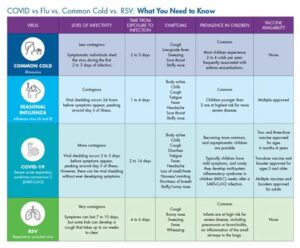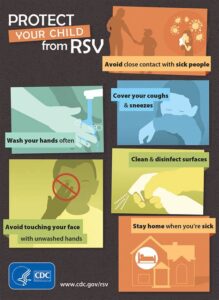Learn about the RSV vaccine, its Medicare coverage, effectiveness for seniors, access options, and cost considerations associated with vaccination.As the seasons change and respiratory illnesses become more common, understanding the intricacies of vaccination against respiratory syncytial virus (RSV) is crucial, particularly for seniors. With the recent approval of the RSV vaccine, many are left wondering about its availability and coverage under Medicare. This blog post aims to provide valuable insights into the RSV vaccine, including essential information you need to know, how Medicare covers the vaccine, its effectiveness in older adults, as well as practical guidance on accessing it through your insurance. Additionally, we will outline important cost considerations to ensure you are fully informed about this vital health service. Staying ahead of respiratory illnesses is essential, and this blog will help you navigate the specifics surrounding the RSV vaccine and Medicare coverage effectively.
RSV Vaccine: What You Need to Know
The Respiratory Syncytial Virus (RSV) is a common virus that can cause severe respiratory illness, especially among vulnerable populations such as infants, young children, and the elderly. As awareness about this virus has grown, so has the importance of the RSV vaccine. Understanding what the vaccine entails is crucial for protecting yourself and your loved ones.
Recent advancements have led to the development of the RSV vaccine, which is designed to reduce the severity of infections caused by this virus. While clinical trials have shown promising results, it’s essential to stay informed about the ongoing research and its implications for public health. If you or a member of your family fall into a high-risk category, it’s worth discussing the availability and recommendations for the vaccine with your healthcare provider.
Additionally, the availability of the RSV vaccine could mean increased safety during peak respiratory virus seasons. Be sure to inquire about potential side effects, the recommended age for vaccination, and how this vaccine may interact with other immunizations. Staying informed will empower you to make the best health decisions for you and your family.
Medicare Coverage for RSV Vaccine
As the RSV (Respiratory Syncytial Virus) continues to pose risks, particularly to vulnerable populations like seniors, understanding Medicare coverage for the RSV vaccine is crucial. In recent developments, Medicare has started to provide coverage for vaccines that protect against RSV, making it easier for older adults to access this vital preventive measure.
Medicare Part B typically covers certain vaccines deemed necessary for public health, including the RSV vaccine. This means that seniors eligible for Medicare can receive the vaccine at no cost if administered at a Medicare-approved facility. It’s essential for beneficiaries to check with their healthcare providers to ensure that the chosen vaccination site is covered under their plan.
Additionally, with the advent of new RSV vaccines, it’s advisable to stay informed about the specific types of vaccines covered by Medicare. This information can vary based on the latest guidelines and recommendations from health authorities. Always consult your Medicare plan’s documentation or speak with a representative to
Effectiveness of RSV Vaccine in Seniors
The Respiratory Syncytial Virus (RSV) is a significant cause of respiratory illness, particularly in vulnerable populations such as seniors. Understanding the effectiveness of the RSV vaccine in seniors is crucial, especially for healthcare providers and families looking to protect their loved ones from this potentially serious infection.
Recent studies indicate that the RSV vaccine shows promising results in enhancing immunity among the elderly. Clinical trials demonstrate that the vaccine can substantially reduce the severity of RSV symptoms and lower the rate of hospitalization among seniors. Researchers found that the vaccine’s efficacy ranged from 65% to 90% depending on the participant’s health status and age group.
In addition to reducing the incidence of severe symptoms, the RSV vaccine is also linked to a decreased risk of complications such as pneumonia and acute respiratory distress syndrome. For seniors with comorbid conditions, the benefits of receiving the vaccine are particularly pronounced, contributing to better overall health outcomes.
| Efficacy Study Results | Percentage Reduction in Symptoms |
|---|---|
| General Senior Population | 65% |
| Seniors with Comorbidities | 90% |
With a growing elderly population, understanding the effectiveness of the RSV vaccine is essential for reducing healthcare burdens and improving quality of life. As healthcare professionals and families make decisions regarding vaccination, keeping informed about vaccine efficacy can help to ensure that seniors are adequately protected.
Accessing RSV Vaccine through Medicare
As the respiratory syncytial virus (RSV) has garnered increased attention, understanding how to access the RSV vaccine through Medicare is vital for seniors. The vaccine serves as a preventative measure against a virus that can be particularly severe in older adults. For those eligible, navigating the Medicare system can sometimes feel daunting, yet properly informing oneself can simplify the process.
Medicare typically covers preventive services, including vaccinations, which means that accessing the RSV vaccine should ideally come with minimal out-of-pocket costs. The first step is to verify your Medicare plan type. Medicare Part B covers certain vaccines, and it is essential to ensure your vaccination is included in that coverage.
| Medicare Plan Type | Coverage Details |
|---|---|
| Medicare Part B | Covers certain vaccinations, including the RSV vaccine with no copayment if administered by an approved provider. |
| Medicare Part D | May also cover additional vaccines but check specific plan details. |
Furthermore, accessing the vaccine involves selecting a provider enrolled in the Medicare program. Many local clinics and pharmacies are equipped to administer the RSV vaccine and accept Medicare. It’s important to schedule an appointment ahead of time and confirm with the provider that they are set up to bill Medicare. By taking these steps, seniors can ensure they protect themselves from the risks associated with RSV without the financial burden.
Cost Considerations for RSV Vaccine and Medicare
When it comes to securing a RSV vaccine, understanding the financial implications is crucial, particularly for seniors covered by Medicare. As the population ages, protection against respiratory syncytial virus becomes more significant. Here are some key cost considerations to keep in mind.
Medicare generally provides coverage for necessary vaccinations, but beneficiaries should be aware of specific policies regarding the RSV vaccine.
| Cost Factor | Details |
|---|---|
| Medicare Part B | Covers certain vaccines, including the RSV vaccine, at no cost for eligible beneficiaries. |
| Out-of-pocket Expenses | While many vaccines are covered, there may still be potential costs such as co-pays or deductibles. |
| Preventive Services | The RSV vaccine is classified as a preventive service, so it might not incur additional costs if recommended by a healthcare provider. |
It’s imperative for beneficiaries to consult their Medicare plan to understand their specific coverage and any cost that may arise when receiving the RSV vaccine. Additionally, discussing with healthcare providers can provide clarity on any potential out-of-pocket expenses linked to the vaccination process.
Ultimately, getting vaccinated against RSV not only enhances personal health but also helps alleviate the strain on healthcare services during peak seasons. Advocating for health through vaccination, especially for vulnerable populations like seniors, holds immense value in maintaining community wellness.
Frequently Asked Questions
What is the RSV vaccine?
The RSV vaccine is a vaccine designed to protect against respiratory syncytial virus (RSV), a common virus that causes respiratory infections, particularly in infants and older adults.
Who should get the RSV vaccine?
While the RSV vaccine is primarily recommended for infants and young children, it may also be indicated for certain at-risk populations, such as older adults and individuals with compromised immune systems.
How does the RSV vaccine work?
The RSV vaccine works by stimulating the immune system to produce antibodies against the RSV virus, thereby providing protection against infection and severe illness.
Does Medicare cover the RSV vaccine?
Medicare coverage for the RSV vaccine may vary; it often covers preventive vaccines, so it is best to check with your Medicare provider or plan to determine specific coverage.
What are the side effects of the RSV vaccine?
Common side effects of the RSV vaccine may include mild pain at the injection site, mild fever, or fatigue. Serious side effects are rare.
When should the RSV vaccine be administered?
The timing for the RSV vaccine can vary based on individual risk factors and the specific vaccine being used; it is crucial to consult with a healthcare provider for personalized recommendations.
How effective is the RSV vaccine?
The effectiveness of the RSV vaccine can vary, but clinical trials indicate that it can significantly reduce the incidence and severity of RSV infections in those it is designed to protect.





